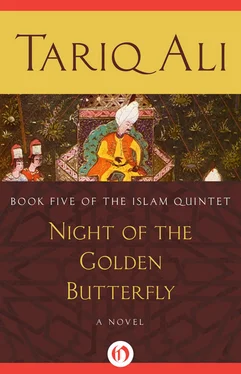The green bomb-shaped blobs with beards were the jihadis, shown in slow separation from the previous two and developing a life of their own. But who were these five bloated figures with linked arms, all of them defecating gold coins, with each figure’s outstretched hand cupped under his neighbour’s buttocks, making sure that the enriched droppings fell on it, until you got to the last figure, who was eating the gold-shit with such vulgar abandon that his face was lathered with it? An odd nose, a typical display of teeth, a populist wave identified this gang as poor Fatherland’s much-despised politicians.
The colours used in this panel matched the intensity of the work. Looked at from a distance it was stunning, but the closer one got to the painting the more horrific it became. What gave this section real depth, however, was not so much the satire, which was obviously strong, but the wall of humanity with which the painter had encircled the canvas. Zaynab had not seen this in the first draft. Plato must have finished it not long before he was taken to the hospital to die. The people on the edge were part-hedge, part-fence, men and women not unlike the ten who had carried the painting into this hall an hour ago and were waiting patiently in the hot sun outside to take it away again.
The people in the painting are also waiting. Why are they waiting? What are they thinking? Portraying them as a wall, Plato is stressing their collective strength. They are many, the cancers are few. What are they waiting for? For the interlinked cancers to reach them? Each face reflects a different form of pain, resignation, anger, despair. I’m reminded of his very first work, the Partition etchings, but this is different, for these people are not simply victims. Their passivity masks their strength. We may be poor, their faces appear seem to be saying, but our dreams are pure. There is no blood on our consciences. Perhaps there should be some. Did Plato feel that too, during his last days, as he fought against time to finish this painting? Some figures have one hand behind their backs. Is the artist implying the existence of concealed weapons? Will the last attempt to save Fatherland come from below and sweep every malignancy away? I don’t know, but that is what I would like to think was in his mind, a last Utopian shout. Was it, Plato?
There are a few smiling faces on the canvas, representing innocence and hope. Infants being suckled by peasant Madonnas, one of them with a tiny mole below her breast, intended to remind us, or perhaps me, of Zaynab. The babies are unaware of what lies ahead, like so many who once thought that Fatherland was the future. This is Plato’s stunning farewell to the land to which he was forced to flee as a refugee more than half a century ago.
We sat in silence for a while, contemplating the work. Alice spoke first. ‘Very brilliant. No doubt about it. His best work. Very brilliant indeed. Some atrophy as they age. He improved with every year. Problems: MoMA won’t take Obama-as-cancer. They would if the picture were by a very famous artist, but Plato has only recently become known in the States.’
‘Don’t tell them,’ said Zaynab. ‘Let them interpret it as they wish.’
‘There is no other interpretation. That’s where the power of the painting lies, Zaynab.’
Yu-chih, who had barely said a word since arriving in this backwater, entered the fray. ‘It’s universal. Any gallery with a curator who knows what constitutes artistic merit will not turn this painting down. The Horse Thief is a very large new gallery in Beijing. They would exhibit this tomorrow. I hope slides are being prepared.’
‘Westward or eastward, Zaynab?’ Tasked in a whisper. She looked at me pleadingly. I turned the Fatherland panel to the wall and displayed the next. This was in classic Plato colours. The entire canvas was covered in waves of blue, turquoise and dark green. We were confronted with a turbulent ocean. Please, I thought, no mermaids. Don’t do it, Plato. In the centre of the painting was a large shell-shaped island with six men surrounding a single woman. Plato had clearly had to restrain himself from painting her as a mermaid. The paint used to cover up the tail was in a slightly different shade, and his death had prevented any further retouching. Five of the figures, surprisingly, were painted almost in Socialist Realist style. Only one, like the sea, was surreal. I moved close to examine the subjects and recognized each one. The others followed suit, and a guessing game began. Everyone knew Kemal Ataturk, though his portrait was the only surreal one. The famous hat, the cryptic smile, the cigarette, the tilted face were all his, but what lay below? He was dressed in tights and his legs were posed in a fantastic pirouette. Rudolf Nureyev or a whirling dervish? The choice was ours. I had no idea that Plato had ever been interested in Ataturk, so this was a surprise — or was he trying to imply something that is often discussed in Istanbul but never written or painted?
The other figures were also from the world of Islam, but of a very different time. Intellectual dissidents, like the man who had painted them, and for that reason heroes who had thrilled his artist’s blood. A blind poet is seated at the feet of the others. On his lap lies a famous work that was, in fact, the only parody ever done of Zaynab’s husband, and that, too, in the twelfth century. How we have progressed. The poet, Abu Ala al-Maari, is conversing with fish and birds. Watching him with kindly, amused and protective expressions are three men in robes and turbans, each clinging to his own best-known work as if someone were threatening to snatch it away from him. These three were old friends I had introduced to Plato thirty years ago, when he was in his most nihilist phase regarding the faith of his forebears: the great scholars of al-Andalus and the Muslim world, Ibn Hazm, Ibn Sina and Ibn Rushd. The last man, and I chuckled with delight, was the Sicilian geographer Muhammad Idrisi, showing them all his map of the world. I introduced these figures to the others, with Zaynab nodding a bit too vigorously, as if she already knew — one of her few irritating habits, because she only did it when she was surprised but did not wish to admit to her lack of knowledge.
At first the single woman puzzled me. Whom had Plato intended? Then I noticed that the uplifted arm had a sleeve with an Arabic inscription: Allah, I am fit for greatness and stride with great pride / I allow my lover to reach my cheek, and I grant my kiss to he who craves it. But it was the hand that seemed odd. It had six fingers. Sixer. It was Wallada! A tenth-century poet in Cordoba who maintained a salon, not far from the Great Mosque, that was the site of many heated debates on art and literature and where gossip-carriers reported each day on the latest goings-on in the city. Sixer was the insult she had publicly hurled at her lover, a truly great poet, Ibn Zaydun, whose love poetry is taught to this day in Arab schools and universities. Zaydun had betrayed Wallada’s love by seducing her maid, and subsequently moved on to young men. The poem she recited against him in public lacked literary merit — unlike her epic in defence of gossip, which only survives in fragments — but was repeated endlessly at the time for its shock value, and poor Ibn Zaydun became known in the city, indeed as far afield as Palermo and Baghdad, as the Sixer:
They call you the Sixer,
Your life will leave you before this name does;
Sodomite and buggered you are, let’s add
Adulterer, pimp, cuckold and thief.
There were ruder epithets as well, but ‘Sixer’ remained stuck to the poet till his enshrouded corpse was lowered into the mud. This panel was obviously ‘The Good Muslim’. I had realized my attention had been so concentrated on the main characters that I had missed a few important details. Just below the surface of the sea, death was lurking in the shape of shark-like creations, a few with long beards. But it was Alice who made the discovery of the afternoon. What I had assumed was just a cloud turned out to be a man’s face. Alice swore loudly that it was James Joyce and repeated the name with incredulity. We inspected the cloud from every distance, and seen from where she was standing, just a few feet from the painting, it was obvious she was right. There was also a number, and Zaynab immediately understood.
Читать дальше












